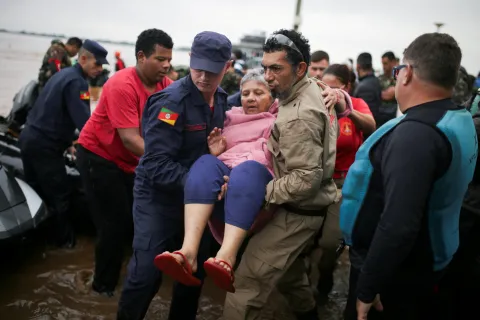In the wake of torrential rains and subsequent floods and mudslides in Brazil’s southern state of Rio Grande do Sul, the toll of devastation continues to rise, with at least 56 lives lost and thousands displaced from their homes, as reported by Al Jazeera.
Emergency responders are engaged in a race against time, striving to rescue individuals trapped amidst the wreckage of collapsed homes, bridges, and roads. The surging water levels in Rio Grande do Sul are placing strain on dams and posing a grave threat to the populous city of Porto Alegre, according to statements from the country’s civil defence agency.
Governor Eduardo Leite has declared a state of emergency as the region grapples with the aftermath of the catastrophic weather event. In a somber acknowledgment of the severity of the situation, Governor Leite lamented that the ongoing disaster marks the worst in the state’s history, with fears that the death toll could climb even higher as rescue operations persist.
President Luiz Inacio Lula da Silva has pledged unwavering support to the affected region, assuring that resources, both human and material, will be mobilized to alleviate the suffering inflicted by the extreme weather conditions.
The forecast paints a grim picture, with warnings of further peril as the Guaiba river, Rio Grande do Sul’s primary waterway, is projected to swell to alarming levels, exacerbating the already dire crisis. Entire communities find themselves isolated, cut off from assistance, as critical infrastructure buckles under the relentless downpour.
In response to the escalating emergency, authorities are urgently advising residents to evacuate from high-risk areas near rivers and vulnerable hillsides susceptible to mudslides. The disruption caused by the disaster extends beyond immediate safety concerns, as access to essential services such as clean drinking water has been severely compromised, leaving hundreds of thousands without basic necessities.
These catastrophic floods and mudslides underscore a broader pattern of extreme weather events plaguing Brazil. Experts point to the impacts of climate change, exacerbated by a recent cold front sweeping across the south and southeast regions, following a period of intense heat, as contributing factors to the heightened frequency and severity of such disasters.


















